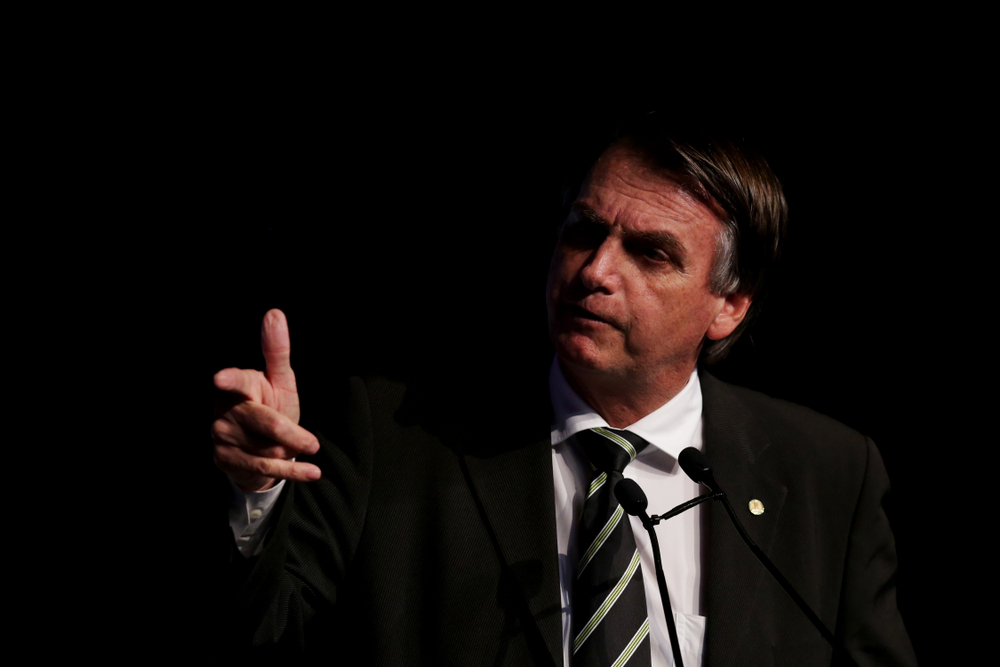On October 28, Jair Bolsonaro accomplished what most political pundits doubted, winning the presidential race by a landslide, earning 55 percent of the valid votes against the Workers’ Party’s Fernando Haddad. He’s been called many things, from radical, racist and misogynistic to anti-democratic and even a fascist. The truth is that Mr. Bolsonato seized, better than anyone, on the country’s crisis of representation to gather a massive following and become the new President of Brazil.
But who is the new president? Find out more about his life, politics, and the promises he made.
Early years
Born in 1955, Jair Bolsonaro was raised in the small city of Eldorado, in the state of São Paulo. He was 15 when Carlos Lamarca, a former military man who defected the Army to fight against the dictatorship, sought refuge in the region. He was one of the local boys who helped members of the Army look for Mr. Lamarca – who nevertheless ended up escaping. But the experience marked the young boy, who “after that started saying he would leave Eldorado to join the Army,” as his mother remembers.
Jair Bolsonaro, the military man
Mr. Bolsonaro joined the Agulhas Negras Military Academy in the 1970s. Those were the so-called “Lead Years,” when hundreds of political opponents of the military dictatorship were incarcerated, tortured, and killed by the government’s political police. Many were buried in mass graves, and many families still have not recovered their remains. Not for a lack of trying, as many search operations were held throughout the decades after the military left power. In 2009, Mr. Bolsonaro belittled these efforts, hanging a poster in his House office saying: “Those who look for bones are dogs.”
He became known in 1986, after an op-ed he published in Veja magazine in 1986, criticizing “low salaries for the military.” He counters information published by the media at the time that dozens of cadets had been dismissed for “sodomy, drug use, and even indiscipline,” saying that the reason was a financial crisis that had victimized officers. Mr. Bolsonaro, then 33, didn’t have the authorization from his superiors to write the op-ed and was immediately punished with 15 days of detention.
Two years later, accusations would be far more serious. In 1988, he was investigated by the alleged participation in a plan to drop flash grenades inside Army barracks. The goal was to pressure the government into raising the salaries of military officers.
The Superior Military Court (STM) found Mr. Bolsonaro “not guilty” in a 9-4 vote, during a secret (but entirely recorded) session on June 16, 1988. The STM trial was the last step in the long case of military rebellion, the first to happen after the end of the military dictatorship.
This was a pivotal moment for the story not only of Mr. Bolsonaro’s life, but also of this country, as it took the young captain out of anonymity and into politics.
Jair Bolsonaro’s political career
If Brazilian politicians generally say slightly different versions of the same non-committal safe discourse, Jair Bolsonaro does not shy away from controversy. Instead, he actively encourages it. In 2011, a group of leftist congressmen made a formal complaint in the House against his demeanor, to which he responded by saying that they were “acting like faggots.” In December 2014, he told a congresswoman she was “too ugly to get raped.”
He was perhaps the most important voice of the anti-gay movement in Congress – and this is a big crowd we’re talking about. Mr. Bolsonaro has once said that people “become” gay due to a lack of parental discipline, and that a little smack on the face when the kids are young would “straighten them out.” His sons, of course, would never be gay because “he raised them appropriately.” Recently, the congressman met with openly gay Canadian actress Ellen Page to discuss the rights of the LGBT community in Brazil. You can see the results yourself:
The former Army captain was once a fringe candidate, regarded as a radical who only pleased retired military men, nostalgic for the military dictatorship.
But in the 2014 election, he was the highest-ranked candidate in his state, winning 464,572 votes – four times as many as he did in 2010. At the beginning of his seventh term in Congress, he declared his intentions of becoming the right-wing candidate, promising to be an “unabashed conservative, an alternative to those who loathe the Workers’ Party.”
Mr. Bolsonaro epitomizes Brazil’s far right. A former captain in the Army and a fervent Catholic, he supports the death penalty, the possibility of imprisonment for life (the current maximum in Brazil is 30 years), a lowering of the minimum age of criminal responsibility, and is against gun control legislation.
A lone wolf in Congress
During his 28 years in office as a congressman, Mr. Bolsonaro never enjoyed much prestige, as he himself acknowledged on several occasions. “I’m nobody here. I’ve never even had the honor of being named deputy whip for my party,” he said during a 2011 speech in Congress. In 2017, he ran for the House Speaker office, earning a total 4 votes (out of 513).
During his three decades as a politician, Mr. Bolsonaro was a member of seven different parties – and always proved to be a niche politician. Of the 190 bills he presented to Congress, 32 percent concerned the military. He said, time and time again, that his role was more to prevent certain bills from passing, such as the so-called “gay kit,” “gay kit,” the name evangelical leaders gave to anti-homophobia material to be distributed in public schools.
One of Jair Bolsonaro’s first actions into his sixth term as congressman, in March 2011, was to draft a motion to summon then-Minister of Education Fernando Haddad to a deposition in the lower house. He wanted Mr. Haddad to explain himself about the so-called “gay kit.” Two weeks later, Mr. Bolsonaro’s motion was crushed by the vast majority of his peers. “Is there a straight man around to back me up?” he asked the House floor, fuming.
Mr. Haddad never acknowledged the congressman, giving an idea of how irrelevant Mr. Bolsonaro was at the time.
Times have changed. In October 2018, Mr. Bolsonaro beat Mr. Haddad in the 2018 presidential election.
Nostalgia for the dictatorship
In the 1990s, he was against the privatizations plan put forward by the Fernando Henrique Cardoso administration. Mr. Bolsonaro went as far as saying that the then-president should have been executed by the dictatorship. He also declared that the dictators were wrong for not having killed over 30,000 people – and that only a civil war (not democracy) could lead to an improvement in Brazil.
2018 presidential campaign
In the hardest-fought campaign in Brazilian democratic history, Mr. Bolsonaro presented himself as an “anti-candidate,” promising to implode the political system. From the go, he marked his opposition to former President Luiz Inácio Lula da Silva – Brazil’s most popular politician. Opinion polls showed that Lula was set to win a third term, but he was never allowed to run. Convicted of corruption and money laundering, he was incarcerated on April 7.
But until mid-September, the Workers’ Party insisted in presenting Lula as the party’s candidate. Insisting with Lula for so long was an obvious decision for a party as rejected and polarizing as the Workers’ Party. Lula remains the country’s most popular political figure, and appeared polling as high as 39 percent late in August. In the Northeast, he was receiving up to 59 percent.
As a matter of fact, if Lula were a candidate, it would not be far-fetched to believe he would pull off a first-round win. But since he was not, the party used his image vouching for understudy Fernando Haddad to the point of exhaustion. That proved to be enough to push Mr. Haddad ahead of all candidates not named Jair Bolsonaro. In the runoff stage, however, Lula proved to be a liability, distancing centrist voters from Mr. Haddad, and throwing almost everyone right of the center into Mr. Bolsonaro’s lap.
The social media campaign
There are many reasons for Mr. Bolsonaro’s win, some of which we have covered in other articles: an anti-system wave, major rejection of the Workers’ Party and its supreme leader, Lula, and a nationwide focus on public safety – an issue that strikes a chord in a country with over 62,000 murders per year. But a major reason for this outcome was social media. Like no one else, Mr. Bolsonaro dominated the guerilla tactics on messaging apps such as WhatsApp to fuel the anti-Workers’ Party sentiment.
And that proved to be the difference in a country where people are addicted to social media. An impressive 68 percent of the electorate has a social media account, and an equally huge 66 percent uses WhatsApp Messenger. And social media was, naturally, source of the campaign’s biggest scandal.
Social media companies had illegal lists of cell phones to which they would send content against Mr. Haddad and his party. It remains unclear how they were obtained: either through leaks in telecom companies, credit companies or other illegal means. They were separated into several clusters, notably municipality of residence, gender, age, and monthly earnings.
Then, each cluster would receive specific content. Content about family-related topics such as same-sex marriage, gender issues, and social minorities would be sent out to more religious or older voters – who tend to be less open on those issues. Criticism of social programs would be forwarded to urban, richer voters – where the discourse of meritocracy against affirmative action is very popular.
It is actually impossible to know the extent of the reach. In July, WhatsApp limited the number of times one can forward the same message to 20. To circumvent this, companies obtained U.S. numbers – which can forward messages to up to 250 people. In about five minutes, you can get a number online for as little as USD 1.49 per month.
The September 6 stabbing
Mr. Bolsonaro spent a good part of the campaign in a hospital bed, after being stabbed in the stomach during a September 6 political rally in the city of Juiz de Fora. The perpetrator was promptly detained and identified as Adélio Bispo de Oliveira, 40. According to the police report, while being carted away the suspect said he was “fulfilling an order from God.” The president-elect underwent emergency surgery and was only released from the hospital on September 29. He still uses a colostomy bag, which will be surgically removed in January.
Sixteen days after being stabbed, Jair Bolsonaro gave his first interview, to newspaper Folha de S.Paulo. It was a short, four-minute talk over the phone, in which he defended Paulo Guedes, the ultra-neoliberal economist Mr. Bolsonaro anointed as his future “super minister” of finance.
Mr. Guedes has been at the center of some controversy this past week, after defending the re-creation of a financial transactions tax – something very unpopular among voters. After the news broke, Mr. Bolsonaro said on Twitter that “Brazil has enough taxes,” and that we wouldn’t create a new one. Since that episode, Mr. Guedes has canceled numerous meetings with TV stations and banks in which he would represent the presidential hopeful.
During his interview with Folha, Mr. Bolsonaro denied talks of a rift between him and Mr. Guedes. He also said that his top economic advisor never defended the re-creation of a new tax, but instead was misinterpreted. He was, according to the candidate, suggesting to simplify Brazil’s tax framework. “He doesn’t have political experience. If he had chosen other words, the press wouldn’t come after him like that,” said the candidate.
More Doctors controversy
Created in 2013 by the Dilma Rousseff administration with the aim of sending healthcare professionals to remote areas of the country, the More Doctors Program employs 18,240 professionals—8,332 of them being from Cuba.
Mr. Bolsonaro announced on Twitter—as he likes to do—that the continuity of the program would be subject to equivalence exams to attest the Cuban doctors’ capacity, that the doctors get the full amount of their salaries, and that they have the “freedom to bring in their families” to Brazil. “Unfortunately, Cuba hasn’t accepted,” Mr. Bolsonaro tweeted on Wednesday.
In a statement, the Cuban Ministry of Public Health said that Mr. Bolsonaro has given “direct, derogatory and threatening references to the presence of Cuban doctors, [declaring] and [reiterating] that he will modify the terms and conditions of the More Doctors Program, disrespecting the Pan American Health Organization and its agreements with Cuba.”
Several areas risk falling into a “state of public calamity,” according to the Brazilian Association of Municipalities (ABM). “Cuban doctors have acted in peripheral areas of metropolitan regions, in indigenous districts, in small towns, and remote areas. For most of these places, the arrival of Cuban doctors represented the first time a healthcare professional ever set foot in the region. Brazilian doctors refuse to go and live in these areas, even if the salaries offered are high,” said a letter from the ABM to the president-elect.
The government opened new spots for doctors, but most failed to show up to work.
Jair Bolsonaro’s promises for the country
Mr. Bolsonaro’s agenda has been more about being the “anti-Workers’ Party,” but his program lacks depth and detail. Here are his main promises:
- Political reform
- Slashing the number of civil servants politically appointed
- A 13th month to Bolsa Família beneficiaries
- Primary surplus by 2020
- A unified, reduced tax system
- Formal independence to the Central Bank, with terms that do not coincide with presidential terms
- Reducing labor rights in the hope of curbing unemployment
- Selling off Petrobras assets
- Massive privatizations (of at least 50 state-owned companies)
- Fewer environmental controls for companies and farmers
- Shutting down the Palestine embassy in Brazil










 Search
Search






































